Books
Books

I Remember
Joe Brainard's I Remember is a literary and artistic cult classic, praised and admired by writers from Paul Auster to John Ashery and Edmund White. As autobiography, Brainard's method was brilliantly simple: to set down specific memories as they rose to the surface of his consciousness, each prefaced by the refrain "I remember": "I remember when I thought that if you did anything bad, policemen would put you in jail."
Brainard's enduring gem of a book has been issued in various forms over the past thirty years. In 1970, Angel Hair books published the first edition of I Remember, which quickly sold out; he wrote two subsequent volumes for Angel Hair, More I Remember (1972) and More I Remember More (1973), both of which proved as popular as the original. In 1973, the Museum of Modern Art in New York published Brainard's I Remember Christmas, a new text for which he also contributed a cover design and four drawings. Excerpts from the Angel Hair editions appeared in Interview, Gay Sunshine, The World and the New York Herald. Then in 1975, Full Court Press issued a revised version collecting all three of the Angel Hair volumes and added new material, using the original title I Remember. This complete edition is prefaced by poet and translator Ron Padgett.
Published 2001
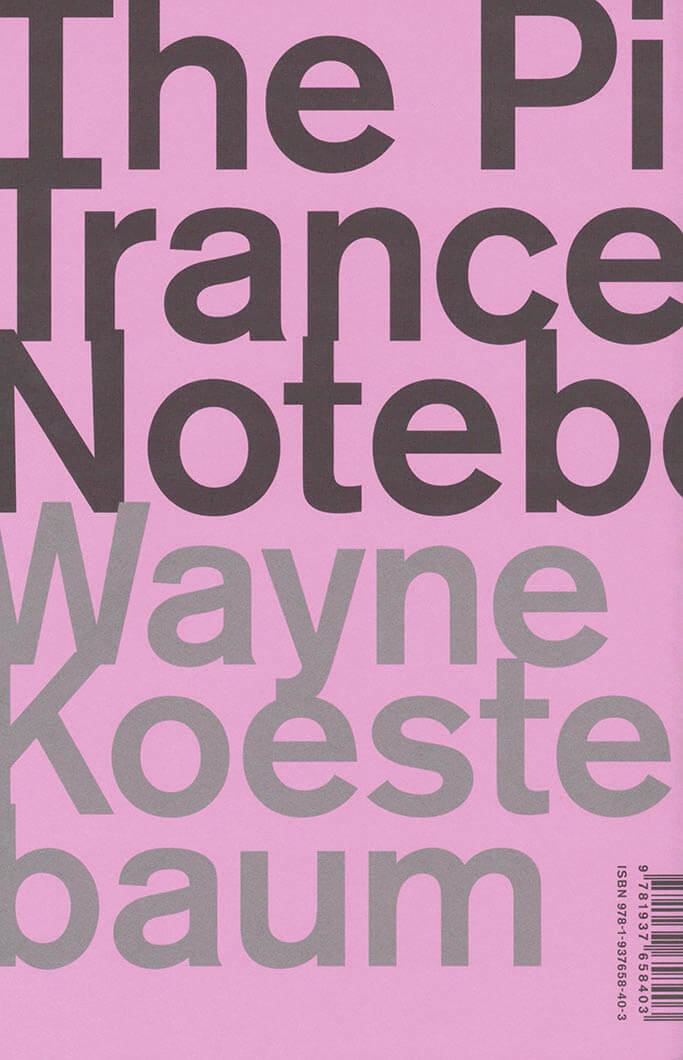
The Pink Trance Notebooks
The Pink Trance Notebooks is the product of the year Wayne Koestenbaum stopped keeping the traditional journal he had maintained for three decades and began a series of "trance notebooks" as a way to reflect an intensified, unmoored consciousness. The resulting sequence of 34 assemblages reflects Koestenbaum's unfettered musings, findings, and obsessions. Freed from the conventions of prose, this concatenation of the author's intimate observations and desires lets loose a poetics of ecstatic praxis—voiced with aplomb and always on point.
"Wayne Koestenbaum is one of the most original and relentlessly obsessed cultural spies writing today. His alarmingly focused attention to detail goes beyond lunacy into hilarious and brilliant clarity." —John Waters
WAYNE KOESTENBAUM is a poet and cultural critic. His recent books include My 1980s & Other Essays, Humiliation, The Anatomy of Harpo Marx, and the poetry collection Blue Stranger with Mosaic Background. He lives in New York City.
Published 2015.

The Cow
This text is filthy and fertilized, filling and emptying, filling and emptying, atrocious and politic with meaning. The Cow is a mother, a lover, and a murdered lump of meat, rendered in the strongest of languages. I cannot count the altering that happens in the very large rooms that are the guts of her.
To call Ariana Reines’ poetry scatological doesn’t even scratch the surface. “I COULD BE A DIAPER FOR THE DAY’S RESIDUALS,” she writes, and, “She clasped the event to her and proceeded. Fucked her steaming/ eyehole and ended it.” The Cow is a body in the way that texts are bodied—”Are you so intelligent your body doesn’t have you in it.”—but not in the way that allows the text to become desensitized, depersonalized, sterilized.
Winner of the 2006 Alberta Prize

The Undying (paperback)
Blending memoir with critique, an award-winning poet and essayist's devastating exploration of sickness and health, cancer and the cancer industry, in the modern world
A week after her 41st birthday, Anne Boyer was diagnosed with highly aggressive triple-negative breast cancer. For a single mother living payslip to payslip, the condition was both a crisis and an initiation into new ideas about mortality and the gendered politics of illness.
In The Undying - at once her harrowing memoir of survival, and a 21st-century Illness as Metaphor - Boyer draws on sources from ancient Roman dream diarists to cancer vloggers to explore the experience of illness. She investigates the quackeries, casualties and ecological costs of cancer under capitalism, and dives into the long line of women writing about their own illnesses and deaths, among them Audre Lorde, Kathy Acker and Susan Sontag.
Genre-bending, devastating and profoundly humane, The Undying is an unmissably insightful meditation on cancer, the cancer industry and the sicknesses and glories of contemporary life.
Winner of The Pulitzer Prize for Nonfiction 2020; Windham Campbell Prize for Nonfiction 2020

Calamities
A collection of linked essays concerned with the life and mind of the writer by one of the most original voices in contemporary literature. Each essay takes a day as its point of inquiry, observing the body as it moves through time, architecture, and space, gradually demanding a new logic and level of consciousness from the narrator and reader.
"Renee Gladman has always struck me as being a dreamer—she writes that way and the dreaming seems to construct the architecture of the world unfolding before our reading eyes."
—Eileen Myles
WINNER of the 2017 Firecracker Award for Nonfiction from the Community of Literary Magazines and Presses (CLMP).
Renee Gladman is a writer and artist preoccupied with lines, crossings, thresholds, geographies, and syntaxes as they play out in the interstices of poetry and prose. She is the author of ten published works, including a cycle of novels about the city-state Ravicka and its inhabitants, the Ravickians; Calamities, a collection of linked essays on writing and experience, which won the 2017 Firecracker Award in Nonfiction; and a monograph of ink drawings, Prose Architectures. She lives in New England with poet-ceremonialist Danielle Vogel.

Manifestly Haraway
Electrifying, provocative, and controversial when first published thirty years ago, Donna Haraway's "Cyborg Manifesto" is even more relevant today, when the divisions that she so eloquently challenges—of human and machine but also of gender, class, race, ethnicity, sexuality, and location—are increasingly complex. The subsequent "Companion Species Manifesto," which further questions the human-nonhuman disjunction, is no less urgently needed in our time of environmental crisis and profound polarization.
Manifestly Haraway brings together these momentous manifestos to expose the continuity and ramifying force of Haraway's thought, whose significance emerges with engaging immediacy in a sustained conversation between the author and her long-term friend and colleague Cary Wolfe. Reading cyborgs and companion species through and with each other, Haraway and Wolfe join in a wide-ranging exchange on the history and meaning of the manifestos in the context of biopolitics, feminism, Marxism, human-nonhuman relationships, making kin, literary tropes, material semiotics, the negative way of knowing, secular Catholicism, and more.
The conversation ends by revealing the early stages of Haraway's "Chthulucene Manifesto," in tension with the teleologies of the doleful Anthropocene and the exterminationist Capitalocene. Deeply dedicated to a diverse and robust earthly flourishing, Manifestly Haraway promises to reignite needed discussion in and out of the academy about biologies, technologies, histories, and still possible futures.
Donna J. Haraway is distinguished professor emerita in the History of Consciousness Department at the University of California, Santa Cruz, where she is also affiliated with the departments of anthropology, feminist studies, environmental studies, and film and digital media. She is an active participant in UCSC's Science and Justice Research Center and the Center for Cultural Studies.
Published 2016
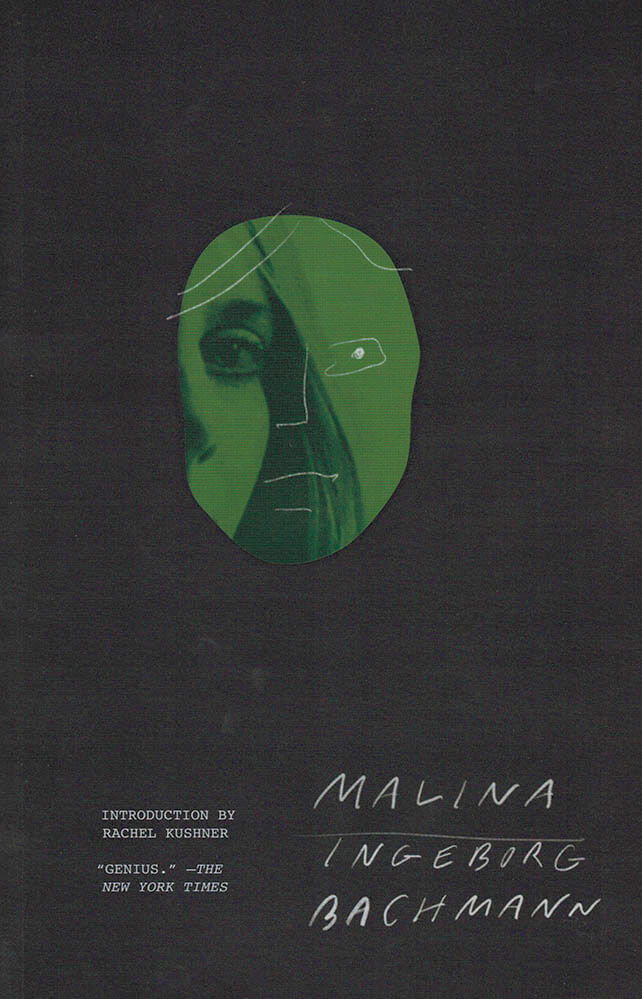
Malina
Malina invites the reader on a linguistic journey, into a world that stretches the very limits of language with Wittgensteinian zeal and Joycean inventiveness, where Ingeborg Bachmann ventriloquizes, and in the process demolishes, Proust, Musil, and Balzac, and yet filters everything through her own utterly singular idiom. Malina is, quite simply, unlike anything else; it's a masterpiece.
In Malina, Bachmann uses the intertwined lives of three characters to explore the roots of society's breakdown that lead to fascism, and in Bachmann's own words, "it doesn't start with the first bombs that are dropped; it doesn't start with the terror that can be written about in every newspaper. It starts with relationships between people. Fascism is the first thing in the relationship between a man and a woman, and I attempted to say that here in this society there is always war. There isn't war and peace, there's only war."
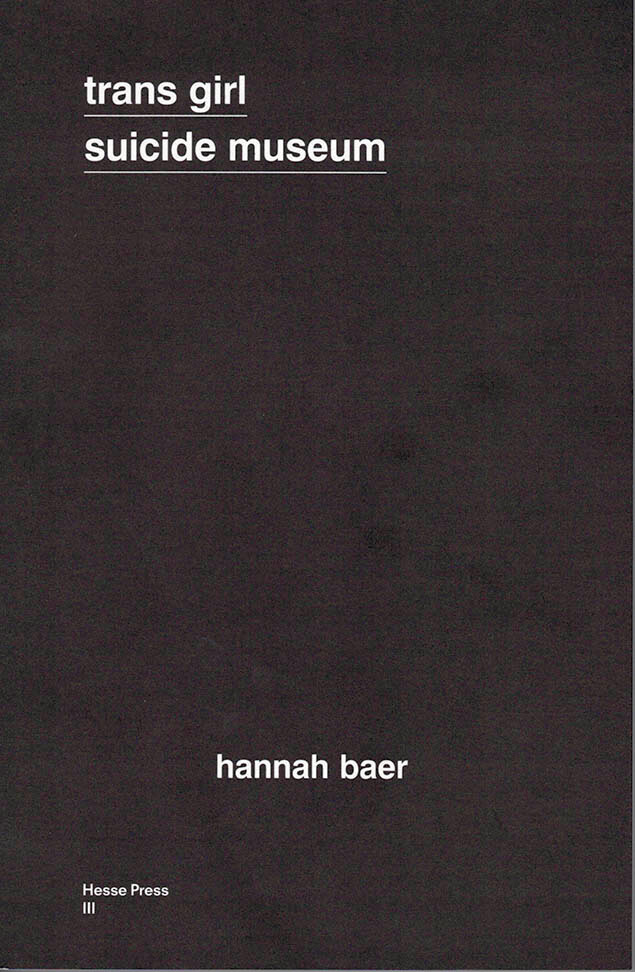
Trans Girl Suicide Museum
One part ketamine spiral, one part confessional travelogue from the edge of gender, TGSM is a hallucinatory transmission on sex, identity, the internet, and the flickering wish not to exist in a given body at a given point in time. TGSM raises questions with which we have begun to negotiate broadly as a culture: what is actually happening to someone when they transition? how should we understand or describe such processes? what is the role of drugs, of hallucination, of imagination, in transition? is being a trans person in this moment in history, when the identity is ever more carefully traced [and tracked] by larger cultural forces, more liberated than before?
Drawing its source material from chance encounters, wordless interactions in basements or bathrooms or hotel rooms, to archives of 20th century critical theory, sleepover secrets exchanged between old friends, rhetorical barbs deployed in the classrooms of elite universities, arguments on the phone with your parents across timezones, the nonverbal codes of high and low fashion, and scribbled notes on the backs of receipts for medicines you don't know how they work, TGSM is a morbid yet strangely hopeful meditation on the possibilities and meanings of gender variation in our time.
Hannah Baer runs the meme account @malefragility on instagram, and studies clinical psychology in new york city.

Fascination
Fascination brings together an early memoir, 'Bedrooms Have Windows' (1989) and a previously unpublished prose work, 'Bachelors Get Lonely', by the poet and novelist Kevin Killian, one of the founding members of the New Narrative movement. The two together depict the author's early years struggling to become a writer in the sexed-up, boozy, drug-ridden world of Long Island's North Shore in the 1970s. It concludes with Triangles in the Sand, a new, previously unpublished memoir of Killian's brief affair in the 1970s with the composer Arthur Russell. Fascination offers a moving and often funny view of the loneliness and desire that defined gay life of that era-a time in which Richard Nixon's resignation intersected with David Bowie's 'Diamond Dogs'-from one of the leading voices in experimental gay writing of the past thirty years. "Move along the velvet rope," Killian writes in 'Bedrooms Have Windows', "run your shaky fingers past the lacquered Keith Haring graffito: 'You did not live in our time! Be Sorry!'"
Kevin Killian's Fascination comes to us with delay, yet arrives, thankfully, as though preserved within the flaps of an unsent, sealed, and searing correspondence, consummate and irreverent, having wasted no time. With their uncompromising wit and harnessed consciousness, Killian's memoirs propose that the project of remembrance, though dotted with loss, is also one of relentless recall for relentless pleasure. Not all of Killian's memories are his, but through him they become yours; others are rewound and replayed. Killian's invitation, though we wouldn't dare to rebuff it: "Remember me!"
— Rachel Valinsky
Kevin Killian was a San Francisco-based poet, novelist, playwright, and art writer. Recent books include the poetry collections Tony Greene Era and Tweaky Village. He is the coauthor of Poet Be Like God: Jack Spicer and the San Francisco Renaissance. With Dodie Bellamy, he coedited Writers Who Love Too Much: New Narrative Writing, 1977-1997.

Rat Bohemia
First published in 1995, this award-winning novel is a bold, achingly honest story set in the "rat bohemia" of New York City, whose huddled masses include gay men and lesbians abandoned by their families and forced to find new bonds with one another in the wake of this loss. Navigating the currents of the city are three friends: Rita Mae, a rat exterminator; Killer, a career plant-waterer; and David, an HIV-positive writer. Together, they seek new ways to be truthful and honest about their lives as others around them avert their glances. Alternately elegiac, defiant, and funny, Rat Bohemia is an expansive novel about how one can cope with loss and heal the wounds of the past by reinventing oneself in the city.
Rat Bohemia won the Ferro-Grumley Award for Lesbian Fiction and was named one of the "100 Best Gay and Lesbian Novels of All Time" by the Publishing Triangle.
Sarah Schulman is the author of eleven previous books, including eight novels, the latest being The Child (2006). As a journalist, her essays have appeared in The New York Times, The Nation, and Interview. She has won a Guggenheim Fellowship and two American Library Association Gay & Lesbian Book Awards. She lives in New York.
Published 2008
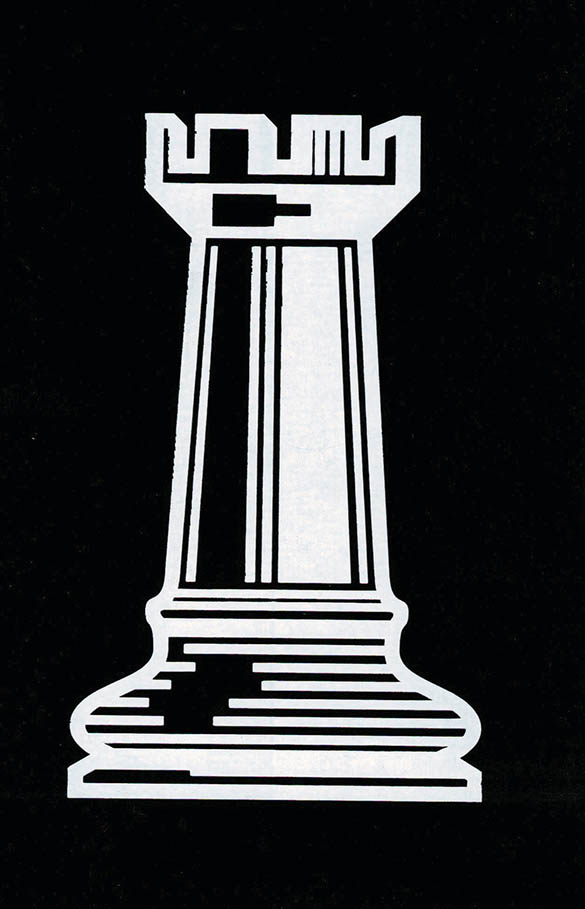
Insufficient Armour
A body of essays and visual contributions by radical theorists around the prosthesis and the "augmented body" issues.
"We all need means of supplementing our natural capabilities, since nature is indifferent, inhuman (extra-human), and inclement; we are born naked and with insufficient armour." — Le Corbusier
Once confined to the narrow circle of "medicalizing" practices, the prosthesis finally colonized our imagination thanks to the promise of an "augmented body" capable of undermining traditional dichotomies such as artificial vs. natural and organic vs. non-organic. But what are their speculative, theoretical and political repercussions? In this selection of original papers, the authors of Insufficient Armour reflect on the subject from their own peculiar perspectives, each of them contributing essays, political-philosophical analysis and theory fiction experiments.
Texts and contributions by Luigi Alberto Cippini, Matt Colquhoun, Helen Hester, Simon Sellars.

Revue Phylactère n° 1 Patati Patata
Roxanne Maillet, Auriane Preud'homme
Phylactère is born from a deep desire to transcribe performance, with authentic, subjective and spontaneous point of views; giving voice to amateurs, artists, designers and thinkers alike. Phylactère is published once a year. Each issue takes an onomatopoeia as its theme. Phylactère publishes transitional writings and in turn welcomes the discrepancies between a script, the performed action, to its translation; with an extreme and adventurous attention given to contexts, gestures, emotions and spaces put at stake during this transcription.
Phylactère is digging into post-performance, allowing those who weren’t present to get a reading of it and experience it from another perspective. This first issue has the theme of the French onomatopoeia Patati Patata: an inexhaustible and endless chatter, long or short discourse, gossip, word of mouth, whispers… Patati Patata or «Yada Yada Yada» in English, is a too much of speech, an endless story, an et cetera expressed out loud. Phylactère is a journal composed of multiple voices, initiated by Roxanne Maillet and Auriane Preud’homme, produced by RondPoint Projects and published by Immixtion Books.
Contributors : Alexandru Balgiu, Anna Tuccio, Anne Marchis Mouren, ArianE Sirota, Barbara Quintin & Liv Schulman, Barthélémy Cardonne, Camille Soulat, Dorota Gaweda & Egle Kulbokaite, etaïnn zwer, Ilke Gers, Josèfa Ntjam, Laure Vigna, Louise Siffert, Lou-Maria Le Brusq, Maria Barnas, Marouchka Payen, Martha Salimbeni, officeabc, Philippe Goguely, Sarah Korzec, Simili Gum, Sven Dehens et Uta Eisenreich.
Texts in English and French
Graphic Design : Auriane Preud'homme et Roxanne Maillet
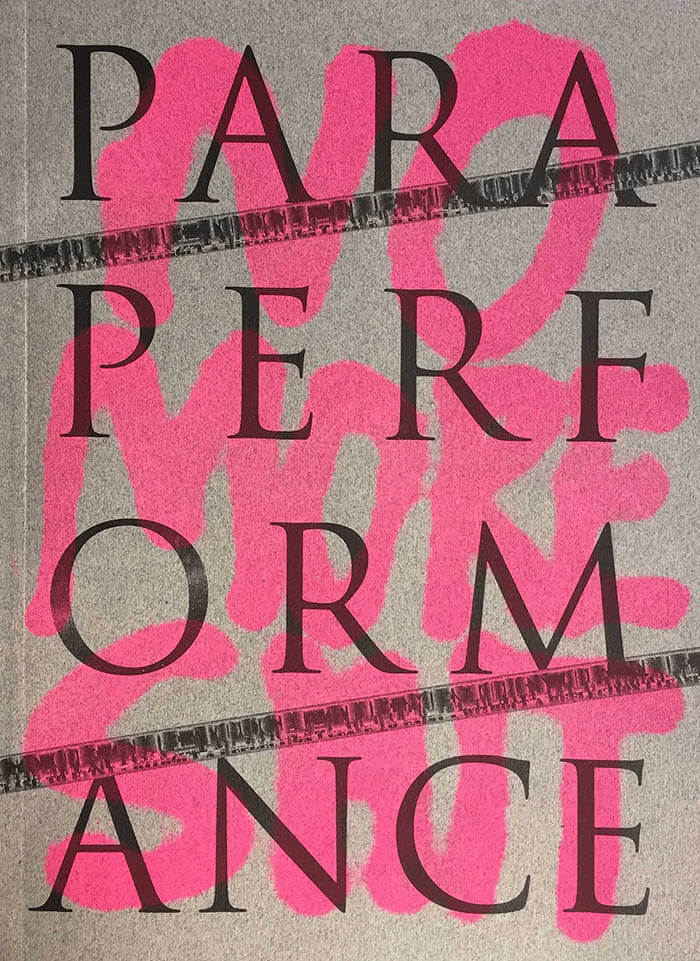
Paraperformance
This first publication brings together texts, documentation, scripts and reference material relating to the body of work Jones started in 2013. Marking a new cycle in his work the book makes a claim about the status of performance in the context of his wider practice and the function of documentation and image regimes in our current times.
The book is claimed to be a form of ‘paraperformance’, meaning a collection of materials that have circulated alongside or chosen to represent the live moments created in his work over a five year period. It represents seven distinct works of installation, sculpture, and performance by Jones including a new work that is made specifically for the pages of this book.
This collection of materials touches on diverse sources and references including the Radical Faerie movement, the Spanish magazine ‘Party’, Liberace’s libel trials, images of uncontacted Amazonian tribes, the political writing of Jean Genet and an early performance work of Vito Acconci to name but a few.
The thread amongst all of the works included in this book is the subtle interweaving of discourses around theatre, performance, the law, representation and politics and the oscillation between urban space, the public sphere and a queer wilderness. More widely the book uses the specificities within Jones’ research to consider the role that performance could play within the art field and, by extension, how documentation and representation of our everyday lives impacts on how we understand our world at large.
This book is part of the series www.anywhereoutofthebook.com series
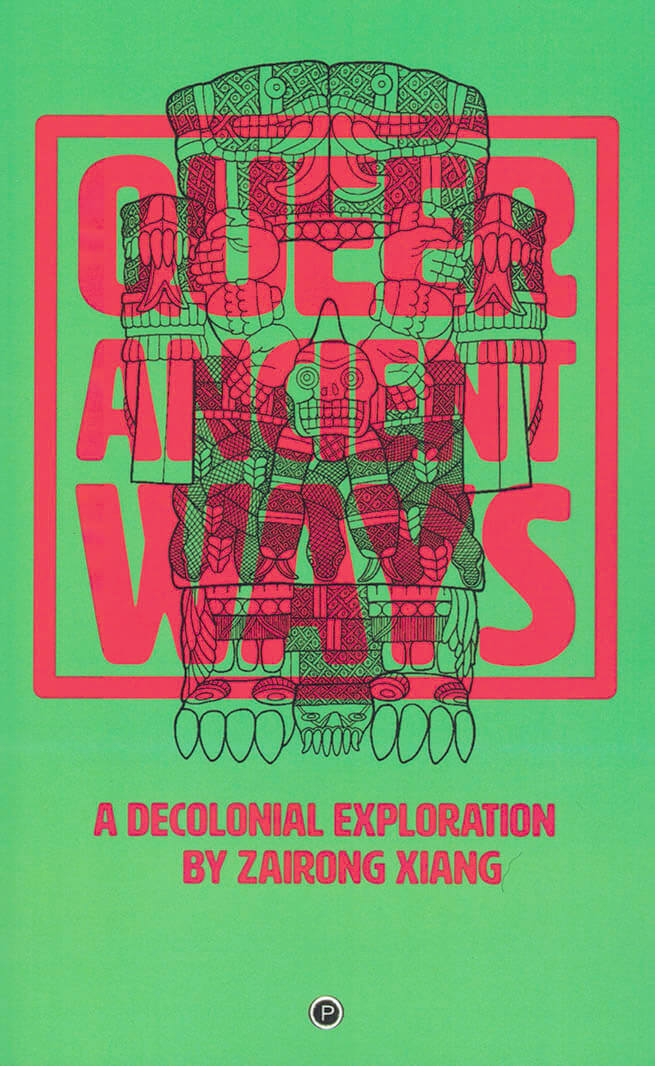
Queer Ancient Ways: A Decolonial Exploration
Queer Ancient Ways advocates a profound unlearning of colonial/modern categories as a pathway to the discovery of new forms and theories of queerness in the most ancient of sources. In this radically unconventional work, Zairong Xiang investigates scholarly receptions of mythological figures in Babylonian and Nahua creation myths, exposing the ways they have consistently been gendered as feminine in a manner that is not supported, and in some cases actively discouraged, by the texts themselves.
An exercise in decolonial learning-to-learn from non-Western and non-modern cosmologies, Xiang's work uncovers a rich queer imaginary that had been all-but-lost to modern thought, in the process critically revealing the operations of modern/colonial systems of gender/sexuality and knowledge-formation that have functioned, from the Conquista de America in the sixteenth century to the present, to keep these systems in obscurity.
At the heart of Xiang's argument is an account of the way the unfounded feminization of figures such as the Babylonian (co)creatrix Tiamat, and the Nahua creator-figures Tlaltecuhtli and Coatlicue, is complicit with their monstrification. This complicity tells us less about the mythologies themselves than about the dualistic system of gender and sexuality within which they have been studied, underpinned by a consistent tendency in modern/colonial thought to insist on unbridgeable categorical differences.
By contextualizing these deities in their respective mythological, linguistic, and cultural environments, through a unique combination of methodologies and critical traditions in English, Spanish, French, Chinese, and Nahuatl, Xiang departs from the over-reliance of much contemporary queer theory on European (post)modern thought. Much more than a queering of the non-Western and non-modern, Queer Ancient Ways thus constitutes a decolonial and transdisciplinary engagement with ancient cosmologies and ways of thought which are in the process themselves revealed as theoretical sources of and for the queer imagination.
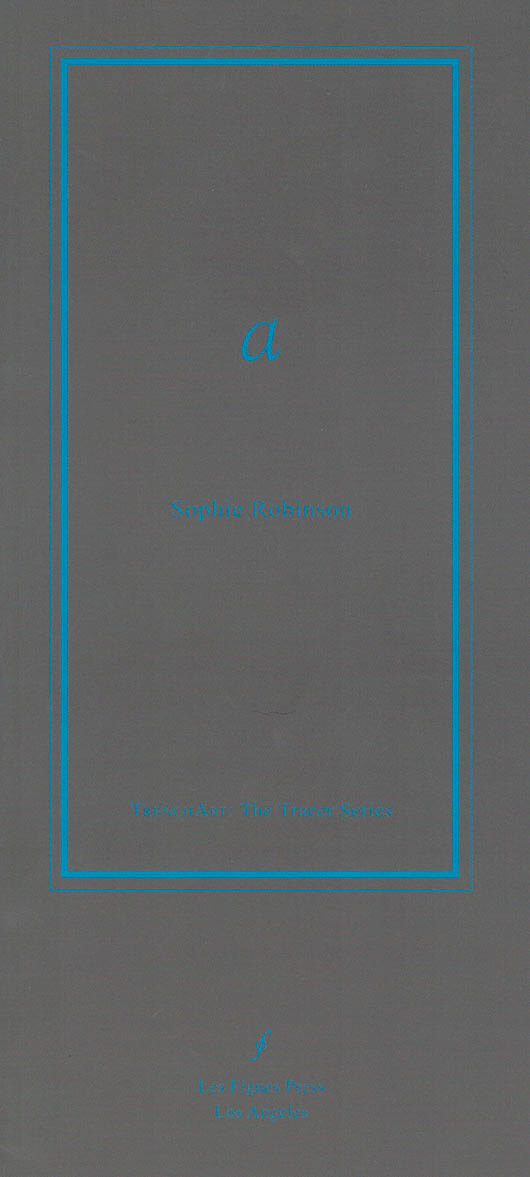
A (Trenchart)
How do you trace death? What do you make of the useless objects left behind? Conjuring Cage, Stein, and Francesca Woodman, British poet Sophie Robinson documents the detritus of sudden loss. Layering word and image, object and subject, the said with the unsayable, A is as Caroline Bergvall writes, "[a] work of mourning. Angry, torn, hardly daring to remember", a textual performance of "love that dares to speak as queer."
A is published as part of the TrenchArt: Tracer Series, with a foreword by Caroline Bergvall, an afterword by Diane Ward, and collaborative visual art by Ken Erhlich and Susan Simpson.

Boeing N° 737-800 in F#m
Concurrently: ode, elegy, satyre, Boeing Nº 737-800 in F♯m awakes and takes off, lands and falls asleep, in between cold sweats and time zones. Triangulating the distance from ground to body, moving though still, to sun, blinding though eyeless, amidst a text searching for sense in an economy of simulations, value suspended 38000 feet above the ground.
The anatomy of the world’s most popular commercial airplane serves as test tube to rehearse, under the common denominator of a possible fall, a motley set of anxieties, crossing borders, with and without passport. Mirror-play, annotated between the internal voice of a passenger, by the window, their dialogue with the Sun and a chorus of various interjections, from cockpit to exhaust pipe.

Atalanta (Acts of God)
The definitive text of Atalanta (Acts of God), which has been performed internationally since the 1980s, includes the entire libretto and an afterword by Ashley, compiled and edited by Sumner Carnahan.
Robert Ashley is a prolific composer and writer, best known for his work in new forms of opera: epic prose poems he sets to music, which have been awarded, commissioned, and performed internationally for over forty-five years. In the 1960s, Ashley organized Ann Arbor's legendary ONCE Festival and directed the ONCE Group. During the 1970s, he directed the Center for Contemporary Music at Mills College, toured with the Sonic Arts Union, and wrote and produced Perfect Lives, an opera for television widely praised as the precursor of music-television.

Hannah Weiner's Open House
Hannah Weiner's Open House beckons us into a realm of poetry that bends consciousness in order to open the doors of perception. Weiner is one of the great American linguistic inventors of the last thirty years of the 20th century. She created an alchemical poetry that transforms the materials of everyday life into a dimension beyond sensory perception. The pieces collected here are as much conceptual art as sprung prose, experimental mysticism as social realism, autobiography as egoless alyric. Patrick Durgin has brought together touchstone works, some familiar and some never before published. Hannah Weiner's Open House provides the only single volume introduction to the full range of Weiner's vibrant, enthralling, and unique contribution to the poetry of the Americas. (Charles Bernstein)
Hannah Weiner's influence extends from the sixties New York avant-garde, where she was part of an unprecedented confluence of poets, performance and visual artists including Phillip Glass, Andy Warhol, Carolee Schneeman, John Perrault, David Antin, and Bernadette Mayer. Like fellow-traveler Jackson Mac Low, she became an important part of the Language movement of the 70s and 80s, and her influence can be seen today in the so-called New Narrative work stemming from the San Francisco Bay Area.
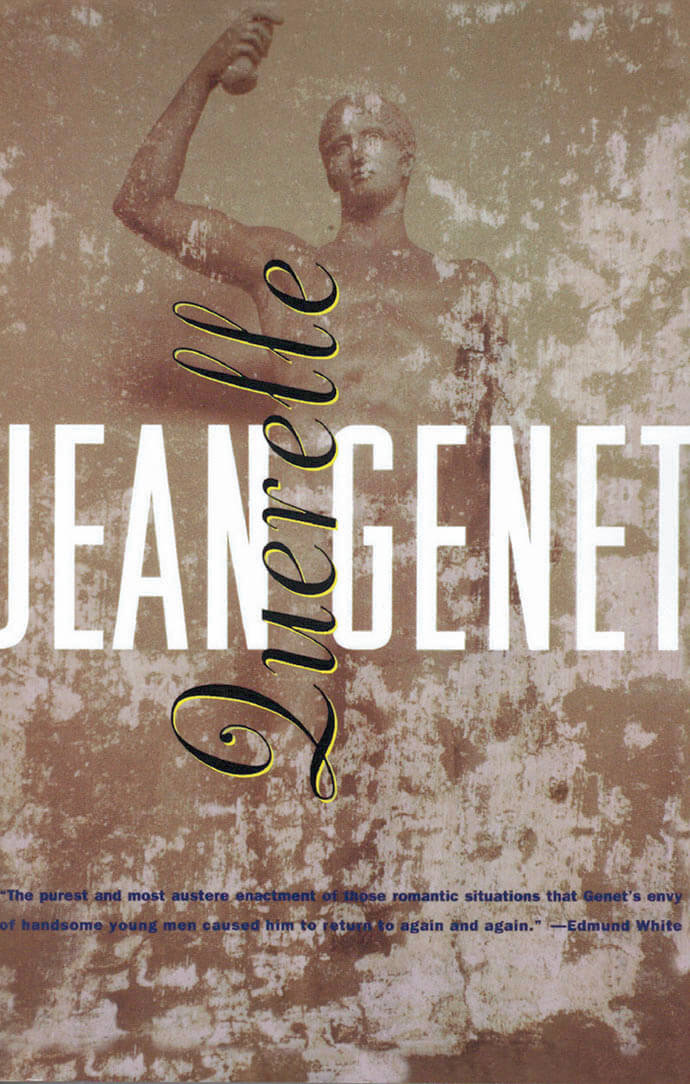
Querelle
The story of a dangerous man seduced by peril, Querelle deals in a startling way with the Dostoyevskian theme of murder as an act of total liberation.
It is set in the midst of the port town of Brest, where sailors and the sea are associated with murder. Georges Querelle, its protagonist, is a bisexual thief, prostitute and serial killer who manipulates and kills his lovers for thrills and profit. The novel formed the basis for Querelle (1982), Rainer Werner Fassbinder's last film.
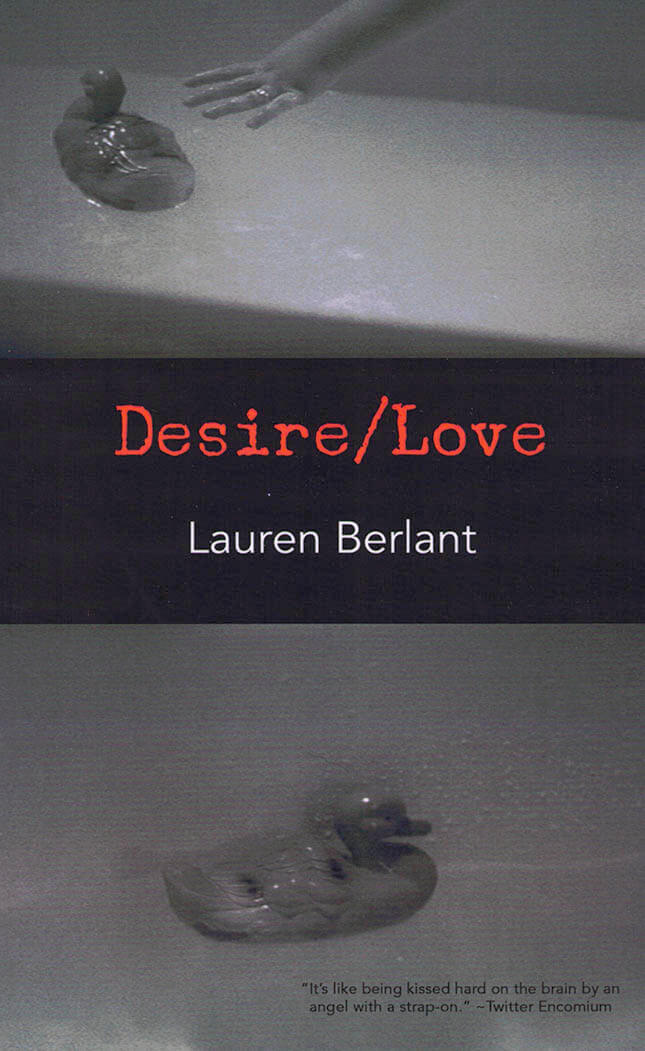
Desire/Love
In this small theoretical novella-cum-dictionary entry, Lauren Berlant engages love and desire in separate entries. In the first entry, Desire mainly describes the feeling one person has for something else: it is organized by psychoanalytic accounts of attachment, and tells briefly the history of their importance in critical theory and practice. The second entry, on Love, begins with an excursion into fantasy, moving away from the parent-child structure so central to psychoanalysis and looking instead at the centrality of context, environment, and history. The entry on Love describes some workings of romance across personal life and commodity culture, the place where subjects start to think about fantasy on behalf of their actual lives.
Whether viewed psychoanalytically, institutionally, or ideologically, love is deemed always an outcome of fantasy. Without fantasy, there would be no love. Desire/Love takes us on a tour of all of the things that sentence might mean.
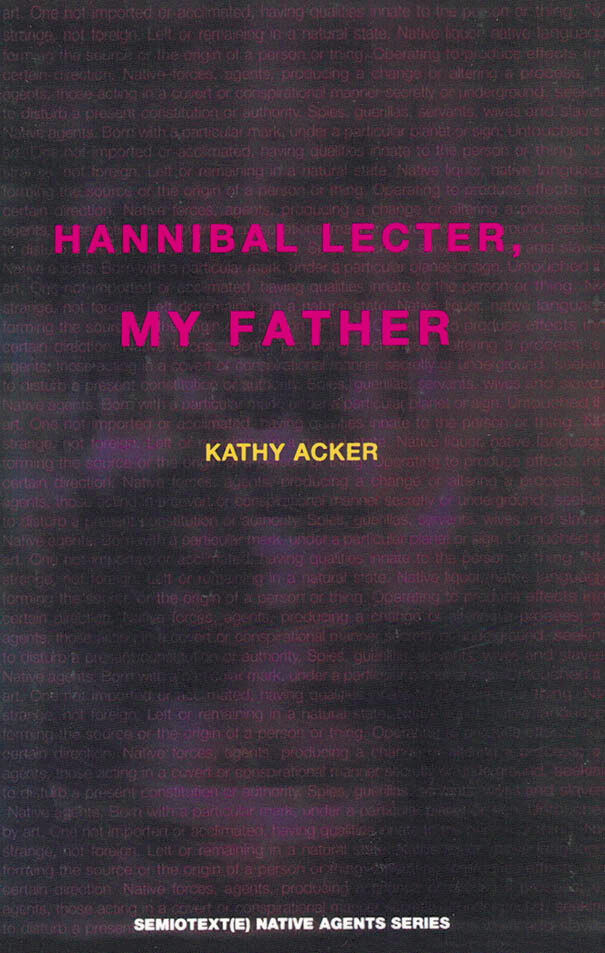
Hannibal Lecter, My Father
A collection of early and not-so-early work by the mistress of gut-level fiction-making.
You can say I write stories with sex and violence and therefore my writing isn't worth considering because it uses content much less lots of content. Well, I tell you this: 'Prickly race, who know nothing except how to eat out your hearts with envy, you don't eat cunt'...
Edited by Sylvere Lotringer and published in 1991, this handy, pocket-sized collection of some early and not-so-early work by the mistress of gut-level fiction-making, Hannibal Lecter, My Father gathers together Acker's raw, brilliant, emotional and cerebral texts from 1970s, including the self-published 'zines written under the nom-de-plume, The Black Tarantula.
This volume features, among others, the full text of Acker's opera, The Birth of the Poet, produced at Brooklyn Academy of Music in 1985, Algeria, 1979 and fragments of Politics, written at the age of 21. Also included is the longest and definitive interview Acker ever gave over two years: a chatty, intriguing and delightfully self-deprecating conversation with Semiotext(e) editor Sylvere Lotringer—which is trippy enough in itself as Lotringer, besides being a real person, has appeared as a character in Acker's fiction. And last, but not least, is the full transcript of the decision reached by West Germany's Federal Inspection Office for Publications Harmful to Minors in which Acker's work was judged to be not only youth-threatening but also dangerous to adults, and subsequently banned.
Acker is the sort of the writer that should be read first at 16, so that you can spend the rest of your life trying to figure her out; she confuses, infuriates, perplexes and then all of a sudden the writing seems to be in your bloodstream, like some kind of benign virus. She's definitely not for the easily offended—but then, there are worse things in life than being offended. Such as the things that Acker writes about...
Kathy Acker was a novelist, essayist and performance artist whose books include Blood and Guts in High School, The Childlike Life of the Black Tarantula, Empire of the Senseless, In Memoriam to Identity, Don Quixote, My Mother: Demonology, and her last novel, Pussy King of the Pirates. Born and raised on New York's Upper East Side, she died of breast cancer in Tijuana, Mexico, in 1997.
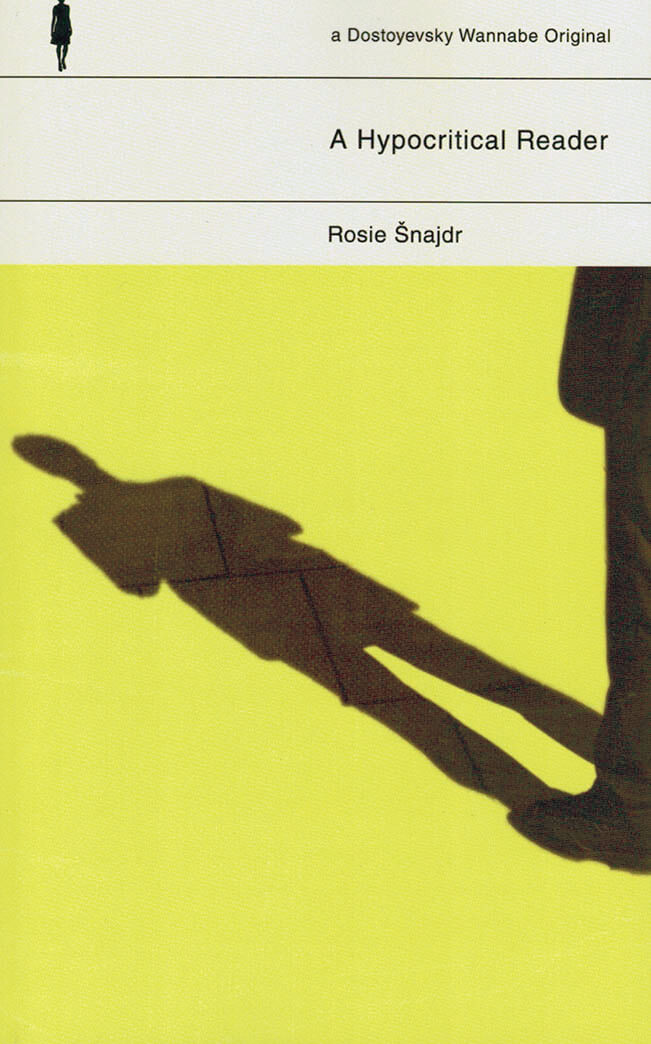
A Hypocritical Reader
A Hypocritical Reader is your emancipation, reader. Want to lose yourself in your favourite genre? This book is for you. Want to question the influence of modernist experimentalism on the short story form? This book is also for you. Want to explore that unspeakable Barthesian dictum? Okay? You want to psychoanalyse the (female) writer? Hmmm. Follow the book's emotional arc, or pick your own path by choosing which pages to turn to. Hell, you can even clip out the individual words and collage your way into exciting new worlds. Just don't tell the author. This book is Calvino, with an attitude.
Rosie Snajdr is an author, editor, and academic. Her work has appeared in The Cambridge Literary Review, Liberating the Canon: An Anthology of Innovative Literature (Dostoyevsky Wannabe), and is forthcoming in TOTAL CANT (Cant Books).

Voice of Hearing
A phenomenology of voice and hearing.
Contemplative, intricate, here the philosopher Vivian Darroch-Lozowski develops a phenomenology of hearing. Where theorizing is a present-tense action. Where a landscape teaches waiting. Where to be in a body is to gesture to another. Where subjectivity is the transformation of language. Where attention releases nascent energy. Where to hear is also to transform. Where myth is a gate. A close attending to this text, which is also a unicorn, will delicately open the reader's time-sense. —Lisa Robertson, author of Cinema of the Present, The Weather, Nilling, and The Baudelaire Fractal.
Vivian Darroch-Lozowski is Professor Emerita of the University of Toronto. Her writings and visual works cover different genres: scholarly, literary, creative non-fiction, artist books, painting/drawing and film. Her books include Notebook of Stone, Antarctica Body, Blue Cloud, Surface of the Living World, and The Uncoded World. Her recent project was returning 160 acres of agricultural land to natural prairie with wetlands. She lives in Moose Jaw, Treaty 4 Territory, Saskatchewan (Canada).
Published Nov 2020

On Gender Performance
Brice Dellsperger, Marie-France Rafael
A conversation about performance, genre and cinema in the subversive work of Brice Dellsperger.
In this conversation between Dellsperger and Marie-France Rafael, following current (post)gender discussions, the artist describes sexuality and (sexual) identity as products of a cultural construction informed by audiovisual technologies. Film, video, and the Internet do not depict a preexisting sexuality but establish an image of it and its (normative) framework. Throughout this exchange, the artist highlights how he, starting from travesty and doubles, undermines existing identity systems in order to develop new artistic strategies for subjectivity.
Brice Dellsperger (born 1972 in Cannes, France, lives and works in Paris) pushes the boundaries of genre and gender. In his multifaceted reprises of iconic film sequences—all assembled under the generic title Body Double—the cineast and artist reenacts the selected scenes frame for frame and lets his “body doubles” perform all of the roles, be they male or female.
Marie-France Rafael (born 19984 in Munich) is a tenure-track professor in the Department of Fine Arts at the Zurich University of the Arts (ZHdK). She holds a PhD in art history; she studied art history and film studies in Berlin and Paris. From 2011 to 2015, she was a research associate at the Free University of Berlin and until 2019 at the Muthesius University Kiel, Department of Spatial Strategies/Curatorial Spaces. She is notably the author of Reisen im Imaginativ: Künstlerische Situationen und Displays (Travel in the Imaginary: Artistic Situations and Displays, 2017) and Ari Benjamin Meyers: Music on Display (2016).
Published Oct 2020.